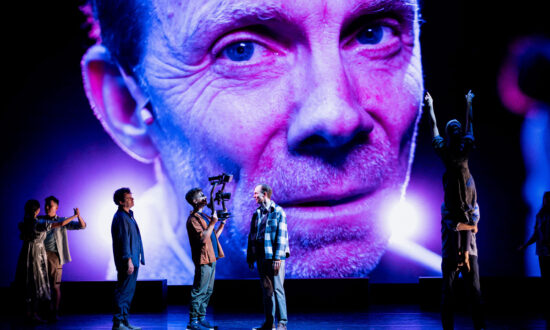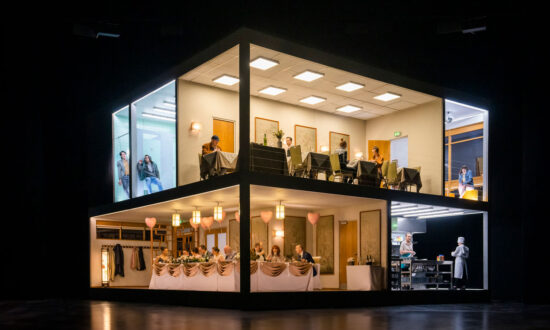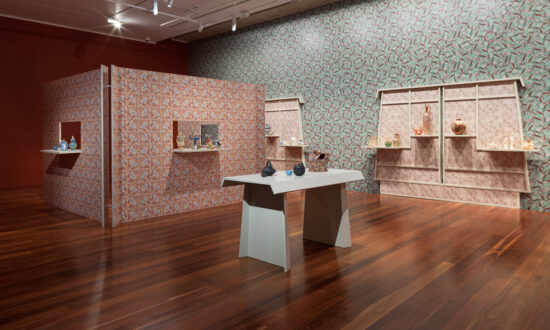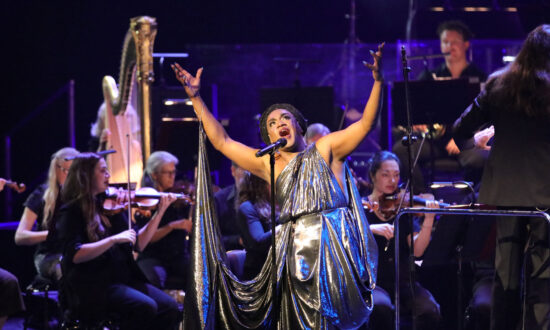A concierge ushers us into a large, dim space. The lamp-lit room is full of whispers. It’s an uncanny atmosphere, a hybrid of underground club and library at night.
We each take a seat at our own small table. In front of us is a ’70s-era rotary phone, a lamp and a tiny switchboard. We lift the handset and immediately we are immersed in the hidden world of those awake in the darkest hours of the night.
A young man despairs he’s lost the best years of his youth to COVID, trapped inside his house. A woman croons a love-song to her insomnia. A man takes a night walk to the creek, trying to slow his thoughts, kept company by the cries of a lonely bird. A paramedic at the end of a long shift prays he’s finished his last job for the night.
It’s addictive, this eavesdropping on the thoughts of those who are alone in the dark. Looking down the rows of tables, each face hovering over a pool of lamplight, no one is fidgeting. This is deep listening. And the beauty is that each audience member’s experience is entirely unique.

The Nightline: Each audience members’ experience is unique. Photo: Tony Lewis
By simply plugging the jack into a different position on the switchboard, you curate your own journey through the stories of the sleepless, moving from poignancy to hilarity at your individual whim.
Extraordinary theatre-maker Roslyn Oades has collaborated once more with acclaimed sound artist Bob Scott to create this bizarrely captivating piece. Renowned for her creative non-fiction and collage-based work, Oades used late-night radio and mysterious city paste-ups to invite night-owls to call a hotline between midnight and 6am. The callers left anonymous voice messages, each a maximum of five minutes long, on any subject they chose. Oades then collated more than 700 of these voice recordings, curating them into possible combinations that prove surprisingly cohesive and at times incredibly dramatic.
Supervising the proceedings from a small stage is the concierge. A stern, librarian-esque figure, she introduces us to the simple technology with clear gestures then keeps watch over the silent audience, sometimes playing solitaire or sipping the beverage she’s poured from a small ’70s-era thermos.
We listen in to the late-night thoughts of storytellers, insomniacs and larrikins, delicately interwoven with an atmospheric sound score. A woman confesses to bullying classmates in high school. Another describes a psychotic episode. There’s joy at seeing owls and the loneliness of long-distance trucking. We hear the voices of the isolated. Those keeping watch. And those who revel in the deep pleasures of quiet and darkness.

Get InReview in your inbox – free each Saturday. Local arts and culture – covered.
Thanks for signing up to the InReview newsletter.
Then the lamps go out. There’s static, crossed lines, a voice frazzles to silence. The whole room is now in the same moment, the dramatic sound and lightscape creating an atmosphere immediately recognisable to anxiety-riven insomniacs. This clever direction gives the experience a slightly more narrative element, carrying the audience into a collective mood, something that is now more than eavesdropping on the emotional lives of others. We’re right there, facing the small hours of the night alongside the voices in our ears, listening to the passing roar of a road train, the transcendent power of an electrical storm or the music of rain on a tin roof.
Oades and Scott have created a bespoke, interactive theatre piece that draws audiences into an intense and compulsive listening experience.
The Nightline can be experienced at the corner of Playhouse Lane and Gilles Arcade until March 20.
Click here for more 2022 Adelaide Festival coverage.
Support local arts journalism
Your support will help us continue the important work of InReview in publishing free professional journalism that celebrates, interrogates and amplifies arts and culture in South Australia.
Donate Here




